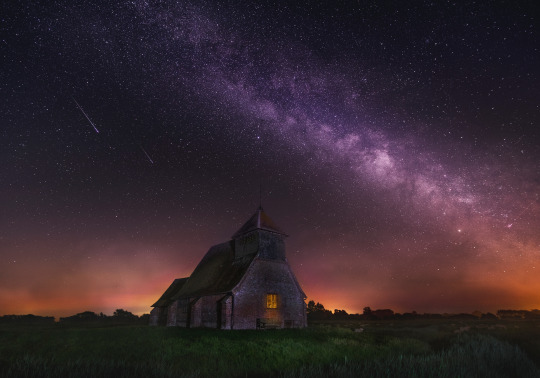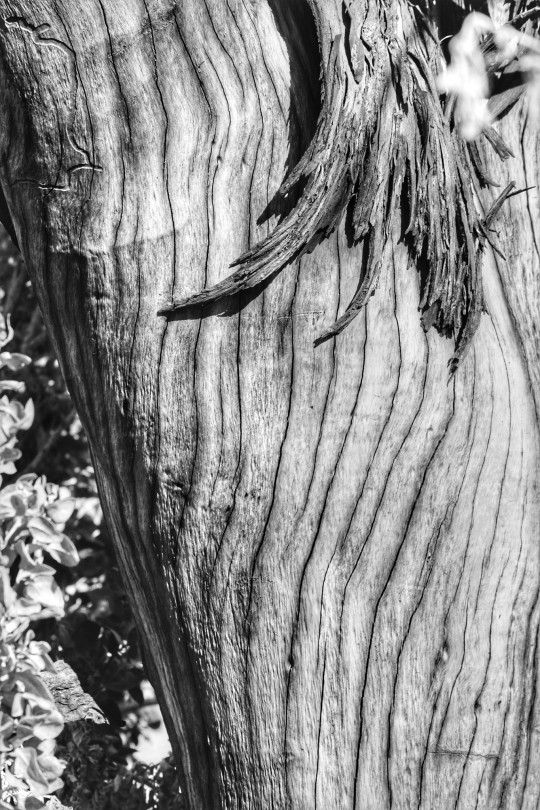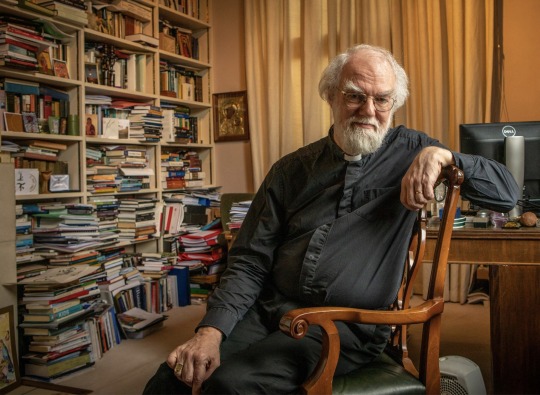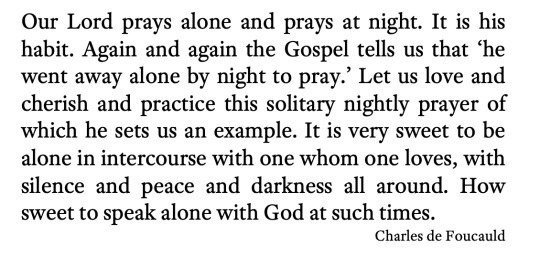#contemplative prayer
Text
Thomas Merton on "knowing God"
God is invisibly present to the ground of our being: our belief and love attain to him, but he remains hidden from the arrogant gaze of our investigating mind which seeks to capture him and secure permanent possession of him in an act of knowledge that gives power over him.
We know [God] in so far as we become aware of ourselves as known through and through by him. We "possess" him in proportion as we realize ourselves to be possessed by him in the inmost depths of our being. ... Hence the aim of meditation, in the context of the Christian faith, is not to arrive at an objective and apparently "scientific" knowledge about God, but to come to know him through the realization that our very being is penetrated with his knowledge and love for us.
Our knowledge of God is paradoxically a knowledge not of him as the object of our scrutiny, but of ourselves as utterly dependent on his saving and merciful knowledge of us.
—Thomas Merton, Contemplative Prayer, p.61
#christian mysticism#christianity#God#thomas merton#contemplative prayer#prayer#christian meditation#quotes
197 notes
·
View notes
Text
As I get older, more removed from the King James Bible and the fundamentalism of my youth, I find myself with other scriptures. Now my sacred texts are:
Leaves of Grass by Walt Whitman
Maurice by E M Forster
The poetry of Mary Oliver
The short stories of Flannery O’Connor
The epic fantasies of J R R Tolkien and Katherine Kurtz
The way the sunlight shines on rhododendron
The way the water feels on my feet in a cool mountain stream
The waves of the ocean
The purring of a cat
The smile of a beloved friend
#walt whitman#e m forster#maurice#mary oliver#flannery o'connor#j r r tolkien#katherine kurtz#contemplative prayer
41 notes
·
View notes
Photo

Eugène Delacroix, (French, 1798-1863)
Le Christ au jardin des oliviers, Detail, c.1824-27
#Jesus Christ#God The Son#Christ in the garden of olives#Jesus in the mount of olives#christian#christianity#Christendom#angel#angels#cherubin#cherub#cherbus#Jesu#western civilization#catholic#agony in the garden#rosary#contemplative prayer
103 notes
·
View notes
Text
"The desert practice of contemplative prayer abandons, on principle, all experiences of God or the self. It simply insists that being present before God, in a silence beyond words, is an end in itself.
God cannot be had, the desert tradition affirms, if this means laying hold of God by way of concept, language, or experience. God is a desert, ultimately beyond human comprehension. John Cassian defined contemplative prayer as an imperfect yet 'astonished gaze at God's ungraspable nature, something hidden' finally from human sight. Evagrius advised his students that 'when you are praying, do not shape within yourself any image of the Deity.' He knew that the God revealed in Jesus Christ is known ultimately only along the dry desert path of faith.
While this actual metaphor of 'God as desert' may not appear before the sixth century (in Pseudo-Dionysius), it stands in concert with earlier teachings of Gregory of Nyssa and is developed later in John Scotus Eriugena, Thomas Gallus, and Meister Eckhart. They unhesitatingly describe God as a desert mountain, high above all understanding.
Still other teachers in the contemplative tradition echo the author of The Cloud of Unknowing in emphasizing the need to love God 'with a naked intent,' completely apart from any of God's attributes or benefits. God is a desert to be entered and loved, never an object to be grasped or understood. In the end, we are no more able to 'possess' God than we are able to possess ourselves. It is only as we abandon every effort to control God by experiencing God, relinquishing even the grasping self (always anxious to add the Deity to its store of personal acquisitions), that the mystery of meeting God beyond experience ever becomes possible."
- Belden C. Lane, from The Solace of Fierce Landscapes: Exploring Desert and Mountain Spirituality, 2007.
#belden c. lane#quote#quotations#apophatic theology#christian mysticism#christian theology#deserts#contemplative prayer#nominalism
8 notes
·
View notes
Text
#rosary#catholicism#catholic faith#catholic#prayer#intercessory prayer#pray the rosary#devotion to mary#marian spirituality#marian devotion#power of the rosary#contemplative prayer
6 notes
·
View notes
Quote
At the point of death that same breath returns to God. (Ecclesiastes 12:7) As with our birth, the presence of breath is not only equated with biological life but that life is clearly attributed to the Author of Life, our sovereign creator God... That Biblical breath is the Holy Spirit.
This is comforting. You have been breathing every day of your life and that very breath is symbolic of God’s spirit with you... Without your being fully conscious of the reality, God’s Spirit has been flowing through you...
In the desire to see God’s Spiritual power in bold manifestations, let us not forget the simple, subtle, and profound way we can have the Spirit in the midst of every minute—literally every breath. The best part is, even when we are not aware of it, that powerful Spirit fills our lives in ways we may never fully know or appreciate...
When we are least able to take the time to think of God and God’s presence, just like breathing, God is still right there... Imagine the power when we take the time to be deliberate and really give God’s Holy Spirit some serious thought!... Breathe deep. Fill your lungs with the breath that flows from the One who created you and called you Good. It’s worth every breath you take!
https://www.currentargus.com/story/life/faith/2019/07/06/breathe-god-breathes-life-into-humanity/1660340001/
#breath of life#temple of god#temple of the holy spirit#inner light#air#immanence#God is with you#God loves you#Holy Spirit#christian meditation#contemplative meditation#contemplative prayer#death
7 notes
·
View notes
Text
Embracing Stillness: The Power of Contemplative Meditation and Prayer

In the hustle and bustle of our modern lives, finding moments of calm and inner peace can seem like a luxury. However, contemplative meditation and prayer offer a profound way to reconnect with ourselves and the world around us. In this post, we'll explore the transformative practice of contemplative meditation and prayer, and how it can enrich our lives.
**What is Contemplative Meditation and Prayer?**
Contemplative meditation and prayer are ancient practices that have been embraced by various spiritual and philosophical traditions worldwide. They share a common goal: to foster a deep sense of self-awareness, mindfulness, and connection with the divine, the universe, or one's inner self.
**The Art of Silence**
At its core, contemplative meditation and prayer involve stillness. They invite us to step away from the noise of our daily lives, both external and internal, and to embrace silence. In this silence, we discover a sanctuary of peace where we can observe our thoughts, emotions, and sensations without judgment.
**A Journey Inward**
Contemplative practices encourage us to turn our attention inward. By doing so, we can explore the depths of our consciousness, unearth hidden truths, and confront the complexities of our existence. It's a journey of self-discovery that can lead to greater self-acceptance and compassion.
**Connecting with the Divine**
For many, contemplative prayer is a way to connect with the divine or a higher power. It's an opportunity to engage in a heartfelt conversation with the universe, seek guidance, or simply bask in the presence of something greater than ourselves. This connection can provide solace, inspiration, and a sense of purpose.
**The Benefits of Contemplative Meditation and Prayer**
1. **Stress Reduction:** Regular contemplative practice has been shown to reduce stress and promote relaxation. It allows us to release the tensions of daily life and cultivate a sense of calm.
2. **Enhanced Focus and Clarity:** Contemplation hones our ability to concentrate and make decisions with greater clarity. It can lead to increased productivity and a deeper understanding of our goals.
3. **Improved Emotional Well-being:** By acknowledging and processing our emotions during contemplation, we can improve our emotional intelligence and resilience. It helps us navigate life's challenges with equanimity.
4. **Spiritual Growth:** For those on a spiritual path, contemplative meditation and prayer are powerful tools for personal growth and enlightenment. They deepen our understanding of our beliefs and connect us with the divine.
**Getting Started**
Embarking on a contemplative journey doesn't require any special skills or equipment. Here are some steps to help you get started:
1. **Find a Quiet Space:** Choose a peaceful environment where you won't be disturbed.
2. **Set an Intention:** Decide what you want to focus on during your practice, whether it's self-discovery, gratitude, or spiritual connection.
3. **Begin with Breath:** Start by paying attention to your breath. Inhale and exhale slowly and deliberately.
4. **Observe Your Thoughts:** As thoughts arise, don't push them away. Instead, acknowledge them and gently return your focus to your breath or chosen point of contemplation.
5. **Practice Regularly:** Consistency is key. Set aside a few minutes each day to engage in contemplative meditation or prayer.
Contemplative meditation and prayer are pathways to inner peace, self-discovery, and spiritual connection. Whether you seek solace, personal growth, or simply a break from the chaos of life, these practices offer a profound and accessible way to enrich your journey. Embrace the stillness, and you may find that the most profound revelations come from the quietest moments.
0 notes
Text
Harmony of the Spirit: Exploring Meditation in Christianity
Introduction to Christian Meditation: Embrace the Spiritual Journey
More than a set of beliefs, Christianity is a way of life. It calls us to actually know God and experience His presence in the depths of our souls, not just to know about Him. Christian meditation is a time-honored tradition embedded into the very fabric of our religion, illuminating this precious journey.
We discover a…

View On WordPress
#Biblical meditation#Christian contemplative traditions#Christian faith#Christian meditation#Christian meditation beginners guide.#Christian mysticism#Christian spirituality#Contemplative prayer#Divine encounters#Meditation testimonies#Mindfulness in Christianity#Prayer practices#Spiritual growth
0 notes
Text
Night Prayer (Psalm 119:49-56)
Stillness and silence can sometimes, ironically, become an alchemy of restlessness and noise.
Remember your promise to me, your servant; it has given me hope.Even in my suffering I was comforted because your promise gave me life.The proud are always scornful of me, but I have not departed from your law.I remember your judgments of long ago, and they bring me comfort, O Lord.When I see the wicked breaking your law, I am filled with anger.During my brief earthly life I…

View On WordPress
#contemplative prayer#control#god&039;s law#insomnia#night prayer#pray#prayer#psalm 119#psalms#self-control#sleep#spiritual formation#spiritual life#spiritual practices#time
0 notes
Text
Shedding Shows Tracks of Other Times
Winter Shedding of bark reveals the track made by a usually hidden creature in some earlier season

#AUSTRALIA#travel#contemplation#newsouthwalesaustralia#country#Winter#barks#nature#rural#contemplative photography#contemplative prayer#contemplative#black and white#monochrome#trees#Achromatic#meditation#broken hill
1 note
·
View note
Text

The character of emptiness, at least for a Christian contemplative, is pure love, pure freedom. Love that is free of everything, not determined by any thing, or held down by any special relationship. It is love for love's sake. It is a sharing, through the Holy Spirit, in the infinite charity of God. And so when Jesus told his disciples to love, he told them to love as universally as the Father who sends his rain alike on the just and the unjust. "Be ye perfect as your Heavenly Father is perfect." This purity, freedom and indeterminateness of love is the very essence of Christianity.
—Thomas Merton, Contemplative Prayer, p.73
#thomas merton#contemplative prayer#catholic#christian#christianity#progressive christian#progressive christianity#christian mysticism#mysticism#jesus of nazareth#jesus#jesus christ#quotes#prayer#lgbtq christian#queer christian#lgbt christian#love#universal love
111 notes
·
View notes
Text

“The Bible has no arguments for the existence of God. There are moments of conflict with God, anger with God, doubt about God's purposes, anguish and lostness when people have no real sense of God's presence. The Psalms are full of this, as is the Book of Job. Don't imagine that the Bible is full of comfortable and reassuring things about the life of belief and trust; it isn't. It is often about the appalling cost of letting God come near you and of trying to trust him when all the evidence seems to have gone.”
~ Rowan Williams, Archbishop of Canterbury from 2002 to 2012, in his book “Tokens of Trust: An Introduction to Christian Belief”
29 notes
·
View notes
Photo

Resting in the Immaculate Heart of Mary
Some time ago I wrote ‘Twelve (Short) Meditations on the Immaculate Heart of Mary‘ on this blog. From this I have distilled seven short aspirations which I sometimes use as the contemplative form of prayer with which I begin my day (after drinking my morning coffee of course, about which I have also blogged.) And this is how it goes-
Bridging Prayers
At the risk of repeating myself from previous posts I want to once again stress the importance of not jumping straight into prayer (or Mass) from whatever non-prayer thing you were doing before. The process of re-orienting yourself from profane activity to sacred activity serves the valuable function of situating you more fully in the present moment, the present action, and taking your mind away (to some extent at least) from the reliving of the past or imagining the future that you normally spend your inside-the-head time doing....(click here to read more)
https://thoughtfullycatholic.wordpress.com/2022/06/02/resting-in-the-immaculate-heart-of-mary/
#immaculate heart of mary#immaculate mary#contemplative prayer#catholic#catholicism#blessed virgin mary
0 notes
Photo

Contemplative meditation house + prayer chamber
Marwan Zgheib
228 notes
·
View notes
Text
I am now offering Spiritual Direction online or in person in Australia for those who want to deepen their faith. If you know anyone who might be interested, please share with them 🙏
#catholicism#catholic faith#catholic#christianity#prayer#spiritual direction#vocations#discernment#vocation discernment#spiritual growth#spiritual life#growing in virtue#contemplative prayer#carmelite#carmelites#Carmelite spirituality
1 note
·
View note
Photo

170 notes
·
View notes